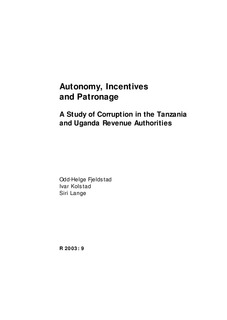Autonomy, Incentives and Patronage. A Study of Corruption in the Tanzania and Uganda Revenue Authorities
| dc.contributor.author | Fjeldstad, Odd-Helge | |
| dc.contributor.author | Kolstad, Ivar | |
| dc.contributor.author | Lange, Siri | |
| dc.date.accessioned | 2008-02-25T08:19:04Z | |
| dc.date.accessioned | 2017-03-29T09:13:20Z | |
| dc.date.available | 2008-02-25T08:19:04Z | |
| dc.date.available | 2017-03-29T09:13:20Z | |
| dc.date.issued | 2003 | |
| dc.identifier.isbn | 82-8062-062-1 | |
| dc.identifier.issn | 0805-505X | |
| dc.identifier.uri | http://hdl.handle.net/11250/2436103 | |
| dc.description.abstract | The report explores factors that explain the observed patterns of corruption within the Tanzania Revenue Authority (TRA) and the Uganda Revenue Authority (URA). In particular, the study discusses the key assumptions behind the revenue authority model and the relevance of these in an African context characterised by scarcity of qualified tax officers, accountants and auditors, as well as clientilistic networks between political, bureaucratic and economic agents. Based on this analysis and in light of existing political, economic and administrative constraints, the study identifies options available for sustainable tax administrative reforms in the two countries. Issues of particular relevance for foreign assistance towards fighting fiscal corruption and strengthening tax administration are highlighted. | |
| dc.language.iso | eng | |
| dc.publisher | Chr. Michelsen Institute | |
| dc.relation.ispartofseries | Research report | |
| dc.relation.ispartofseries | R 2003: 9 | |
| dc.subject | Corruption | |
| dc.subject | Incentives | |
| dc.subject | Social norms | |
| dc.subject | Tax administration | |
| dc.subject | Tax evasion | |
| dc.subject | Tanzania | |
| dc.subject | Uganda | |
| dc.title | Autonomy, Incentives and Patronage. A Study of Corruption in the Tanzania and Uganda Revenue Authorities | |
| dc.type | Research report |
Tilhørende fil(er)
Denne innførselen finnes i følgende samling(er)
-
Bora-import [434]
